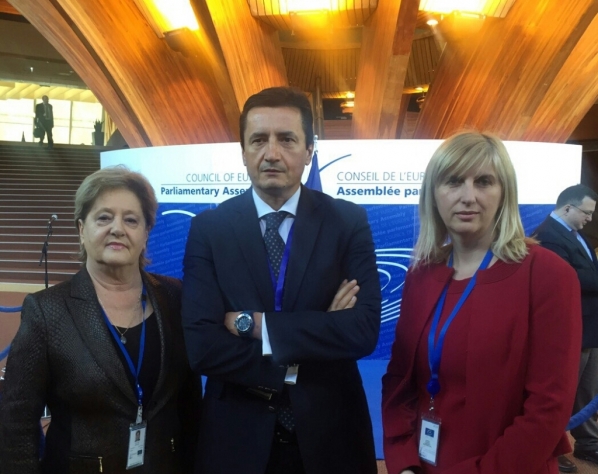The Parliamentary Assembly has expressed serious concern over the increased number of young persons, including minors, who are joining the extremist movements engaged in armed conflicts and acts of terrorism, including those in Europe. A resolution devoted to this issues was adopted at today’s session, and PACE expressed confidence that the prevention was key to stopping the radicalisation of children. The parliamentarians say in the adopted text that prevention, de-radicalisation and rehabilitation strategies must be based on respect of human rights and fundamental freedoms, target the individual in his or her specific context, and be comprehensive and based on multi-agency local partnerships.
Speaking about the importance of education for democratic citizenship, PACE parliamentarians stressed that young people should be given all the tools they need to acquire the skills required to build a pluralistic society based on solidarity, democratic values and human rights. And it is not possible to acquire these skills without a quality education in democratic citizenship, human rights and intercultural dialogue, of which school must be one of the pillars. Therefore, the Assembly welcomed the initiative towards development of a European Framework of Competences for a culture of democracy and intercultural dialogue. The purpose of this tool is to raise awareness on the importance of education for democratic citizenship.
The afternoon part of today’s session was devoted to evaluation of partnership for democracy with regard to the Palestinian National Council. PACE has welcomed active participation of the Palestinian Delegation in the work of the Assembly and its bodies, and encouraged it to “step up efforts” to speed up reform and to address human rights and rule of law concerns, in line with the political commitments undertaken by acquiring the status of partner for democracy in 2011.
Today, the Parliamentary Assembly was addressed by President of the European Commission Mr Jean-Claude Juncker and Prime Minister of Turkey Mr Ahmet Davutoglu, while Secretary General of the Council of Europe Mr Thorbjørn Jagland answered questions from parliamentarians with regard to the deal between the European Union and Turkey on migrant crisis, state of human rights in Crimea, Savchenko case, elections in Macedonia and other current issues.
As a part of elections and appointments, Mr Marko Bošnjak was elected judge of the European Court of Human Rights in respect of Slovenia.
During the day, meetings of several working bodies of the PACE were held, including: Committee on Political Affairs and Democracy, Committee on Migration, Refugees and Displaced Persons, Committee on Equality and Non-Discrimination and Committee on Legal Affairs and Human Rights
Day three of the session will be devoted to the fight against antisemitism in Europe, intellectual property rights in the digital era. The refugee and migrant crisis in Europe will be on the agenda, with debates on a stronger European response to the Syrian refugee crisis, the human rights of refugees and migrants in the Western Balkans and the position of refugees and migrants following signing of the deal between the European Union and Turkey.
Delegation of the Parliament of Montenegro participating in the spring session is composed of: Mr Predrag Sekulić, Head of Delegation, Ms Marija Maja Ćatović and Ms Snežana Jonica, members of Delegation.








